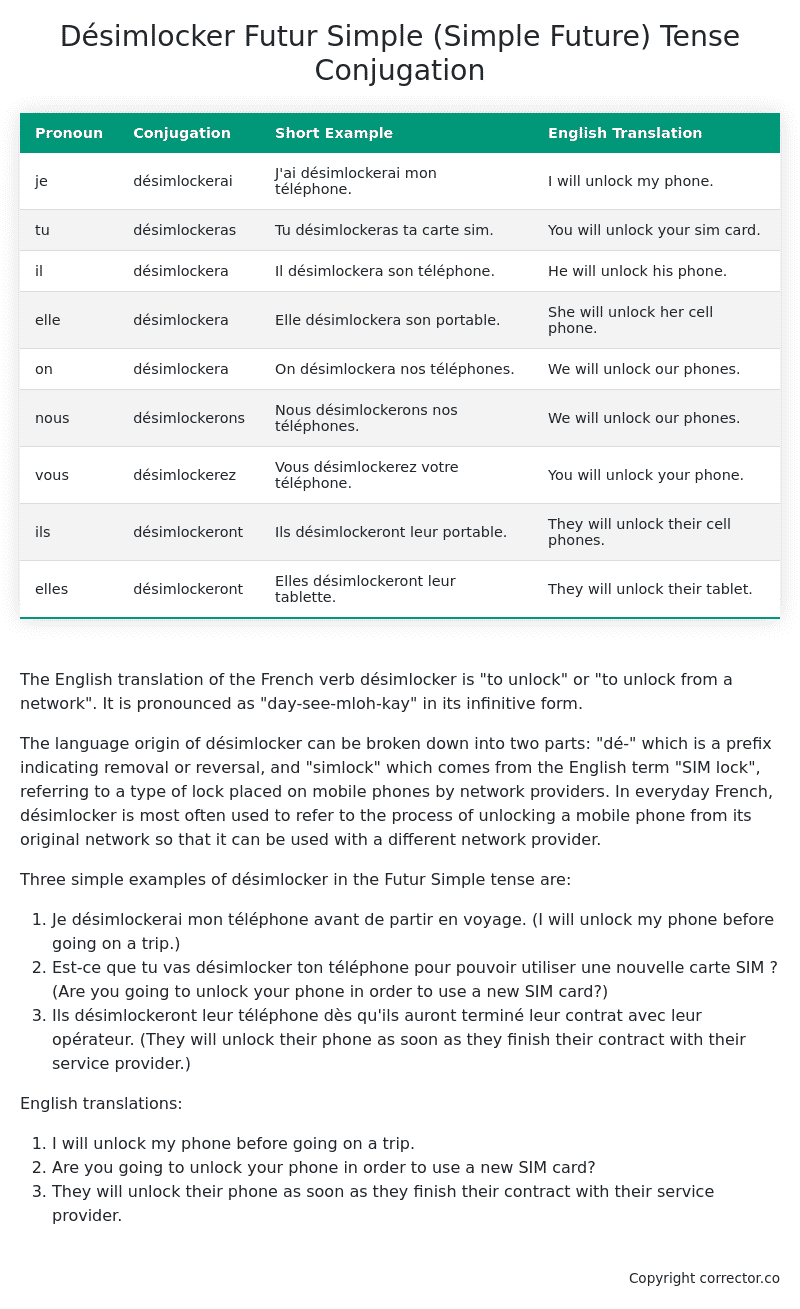Futur Simple (Simple Future) Tense Conjugation of the French Verb désimlocker
Introduction to the verb désimlocker
The English translation of the French verb désimlocker is “to unlock” or “to unlock from a network”. It is pronounced as “day-see-mloh-kay” in its infinitive form.
The language origin of désimlocker can be broken down into two parts: “dé-” which is a prefix indicating removal or reversal, and “simlock” which comes from the English term “SIM lock”, referring to a type of lock placed on mobile phones by network providers. In everyday French, désimlocker is most often used to refer to the process of unlocking a mobile phone from its original network so that it can be used with a different network provider.
Three simple examples of désimlocker in the Futur Simple tense are:
- Je désimlockerai mon téléphone avant de partir en voyage. (I will unlock my phone before going on a trip.)
- Est-ce que tu vas désimlocker ton téléphone pour pouvoir utiliser une nouvelle carte SIM ? (Are you going to unlock your phone in order to use a new SIM card?)
- Ils désimlockeront leur téléphone dès qu’ils auront terminé leur contrat avec leur opérateur. (They will unlock their phone as soon as they finish their contract with their service provider.)
English translations:
- I will unlock my phone before going on a trip.
- Are you going to unlock your phone in order to use a new SIM card?
- They will unlock their phone as soon as they finish their contract with their service provider.
Table of the Futur Simple (Simple Future) Tense Conjugation of désimlocker
| Pronoun | Conjugation | Short Example | English Translation |
|---|---|---|---|
| je | désimlockerai | J’ai désimlockerai mon téléphone. | I will unlock my phone. |
| tu | désimlockeras | Tu désimlockeras ta carte sim. | You will unlock your sim card. |
| il | désimlockera | Il désimlockera son téléphone. | He will unlock his phone. |
| elle | désimlockera | Elle désimlockera son portable. | She will unlock her cell phone. |
| on | désimlockera | On désimlockera nos téléphones. | We will unlock our phones. |
| nous | désimlockerons | Nous désimlockerons nos téléphones. | We will unlock our phones. |
| vous | désimlockerez | Vous désimlockerez votre téléphone. | You will unlock your phone. |
| ils | désimlockeront | Ils désimlockeront leur portable. | They will unlock their cell phones. |
| elles | désimlockeront | Elles désimlockeront leur tablette. | They will unlock their tablet. |
Other Conjugations for Désimlocker.
Le Present (Present Tense) Conjugation of the French Verb désimlocker
Imparfait (Imperfect) Tense Conjugation of the French Verb désimlocker
Passé Simple (Simple Past) Tense Conjugation of the French Verb désimlocker
Passé Composé (Present Perfect) Tense Conjugation of the French Verb désimlocker
Futur Simple (Simple Future) Tense Conjugation of the French Verb désimlocker (this article)
Futur Proche (Near Future) Tense Conjugation of the French Verb désimlocker
Plus-que-parfait (Pluperfect) Tense Conjugation of the French Verb désimlocker
Passé Antérieur (Past Anterior) Tense Conjugation of the French Verb désimlocker
Futur Antérieur (Future Anterior) Tense Conjugation of the French Verb désimlocker
Subjonctif Présent (Subjunctive Present) Tense Conjugation of the French Verb désimlocker
Subjonctif Passé (Subjunctive Past) Tense Conjugation of the French Verb désimlocker
Subjonctif Imparfait (Subjunctive Imperfect) Tense Conjugation of the French Verb désimlocker
Conditionnel Présent (Conditional Present) Tense Conjugation of the French Verb désimlocker
Conditionnel Passé (Conditional Past) Tense Conjugation of the French Verb désimlocker
L’impératif Présent (Imperative Present) Tense Conjugation of the French Verb désimlocker
L’infinitif Présent (Infinitive Present) Tense Conjugation of the French Verb désimlocker
Struggling with French verbs or the language in general? Why not use our free French Grammar Checker – no registration required!
Get a FREE Download Study Sheet of this Conjugation 🔥
Simply right click the image below, click “save image” and get your free reference for the désimlocker Futur Simple tense conjugation!

Désimlocker – About the French Futur Simple (Simple Future) Tense
Formation of Futur Simple
For regular -er verbs (e.g., parler – to speak)
For regular -ir verbs (e.g., finir – to finish)
For regular -re verbs (e.g., vendre – to sell)
Common Everyday Usage Patterns
Conditional Statements
Interactions with Other Tenses
Futur Antérieur
Conditional
Present
Summary
I hope you enjoyed this article on the verb désimlocker. Still in a learning mood? Check out another TOTALLY random French verb conjugation!


